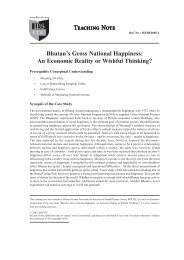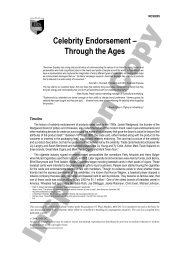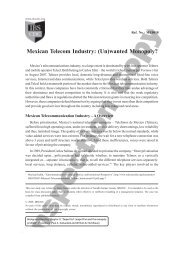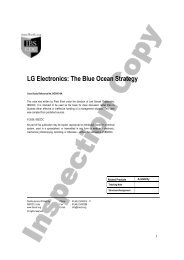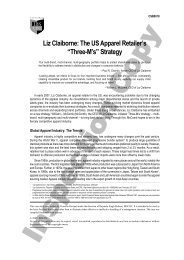Entrepreneurship Case Studies Catalogue
Entrepreneurship Case Studies Catalogue
Entrepreneurship Case Studies Catalogue
Create successful ePaper yourself
Turn your PDF publications into a flip-book with our unique Google optimized e-Paper software.
shoe-shining service. However, as it plans<br />
to become a self-sustained business by<br />
2007, it is facing certain challenges that<br />
are commonly encountered by social<br />
enterprises, especially if they are in the<br />
business of shoe shining, which is<br />
considered to be demeaning by many.<br />
Pedagogical Objectives<br />
• To understand the factors that led to<br />
the genesis of social enterprises and<br />
social entrepreneurship<br />
• To analyse the need for and the impact<br />
of social enterprises on society<br />
• To discuss the business model of<br />
StreetShine and debate whether it can<br />
become a self-sustained enterprise in the<br />
near future.<br />
Industry Not Applicable<br />
Reference No. ENT0025<br />
Year of Pub. 2006<br />
Teaching Note Not Available<br />
Struc.Assig. Not Available<br />
keywords<br />
Nick Grant; Definition of social<br />
entrepreneurship; Social entrepreneurship<br />
life cycle; Social enterprise; Social<br />
entrepreneurship; Shoe-shining; Nongovernment<br />
organisations; Ashoka Fellows;<br />
A glimmer of hope; Mohammed Yunus;<br />
Bangladesh Grameen Bank; Bill Drayton.<br />
Bill Drayton’s ‘Ashoka’: The<br />
Social Entrepreneur’s ‘Social<br />
Enterprise’<br />
Transformation in global society took place<br />
after the Industrial Revolution of UK in<br />
1700. The Industrial Revolution divided the<br />
society into two unequal sectors – business<br />
and social. While the business sector grew<br />
at a rapid rate, the other half of the society<br />
lagged behind. However, the situation began<br />
to change slowly when from 1980 the social<br />
entrepreneurship concept began to become<br />
popular. Bill Drayton (Drayton), the<br />
founder of Ashoka, was the person primarily<br />
responsible for the popularisation of the<br />
concept of social entrepreneurship. He<br />
established Ashoka in 1980 to support<br />
individuals involved in this field of social<br />
entrepreneurship. The enterprise first seeks<br />
to find out leading social entrepreneurs<br />
across the world, who are then provided<br />
financial support to assist in their mission<br />
to solve social problems. These members<br />
are responsible for bringing major social<br />
changes in their respective fields.<br />
Pedagogical Objectives<br />
• To discuss the negligence of social sector<br />
after the Industrial Revolution<br />
• To discuss the changes that took place<br />
in the social sector from the year 1980<br />
• To understand Ashoka’s model of social<br />
development and Bill Drayton’s efforts<br />
to provide a fillip to the social sector<br />
• To debate the sustainability of social<br />
entrepreneurship.<br />
Industry Social <strong>Entrepreneurship</strong><br />
Reference No. ENT0024<br />
Year of Pub. 2006<br />
Teaching Note Not Available<br />
Struc.Assig. Not Available<br />
keywords<br />
Social enterprise; Social entrepreneurship;<br />
Business sector; Social sector; Ashoka; Bill<br />
Drayton; Social achievements; Ashoka<br />
Fellows; Social changes; Change maker.<br />
Patrick J. McGovern’s<br />
International Data Group:<br />
Growth Strategies in Asia<br />
With constant focus on identifying newer<br />
markets and opportunities, Patrick J.<br />
McGovern (McGovern), the founder of<br />
International Data Group (IDG), has<br />
transformed his company as the leading<br />
provider of research and publication on<br />
technology and media in the world. One of<br />
the earliest publishing companies from the<br />
US to foray into Asia, IDG has been the<br />
first US publisher to enter China in 1980.<br />
The growth potential of the Asian market<br />
has placed Asia at the center of IDG's future<br />
growth strategies as McGovern estimates<br />
that China would be the largest contributor<br />
to its revenue by 2020. The case, while<br />
describing the inception, growth and<br />
products of IDG, especially in Asian<br />
countries, offers scope to discuss the entry<br />
and growth opportunities in emerging<br />
economies.<br />
Pedagogical Objectives<br />
• To understand the entrepreneurial and<br />
leadership strategies of Patrick J.<br />
McGovern and how he expanded his<br />
business empire through his business<br />
vision and the knack to spot new<br />
markets and opportunities<br />
• To analyse the critical success factors in<br />
the global online publishing industry<br />
• To debate the efficacy of IDG’s growth<br />
strategies in Asia, especially in the light<br />
of rampant piracy and poor intellectual<br />
property track record of China.<br />
Industry Periodicals Publishing<br />
Reference No. ENT0023<br />
Year of Pub. 2006<br />
Teaching Note Not Available<br />
Struc.Assig. Not Available<br />
keywords<br />
Patrick J McGovern; International Data<br />
Group (IDG); International Data<br />
Corporation (IDC); Growth strategies in<br />
Asia; IDG's product profile; IDG's corporate<br />
culture; IDG in China; Computerworld;<br />
Growth of International Data Group; IDG<br />
in Asia.<br />
Wilbur Ross: The Buyout King<br />
After his MBA from Harvard, and as an<br />
executive at Rothschild Inc. for 25 years,<br />
Wilbur Ross has been a financial adviser to<br />
creditors and stockholders of bankrupt<br />
companies like Texaco, Eastern Airlines<br />
and Ling-Temco-Vought (LTV) steel. In<br />
1998, Fortune magazine named Wilbur<br />
Ross as the ‘King of Bankruptcy’. In 2000,<br />
Ross established his own private equity<br />
company, WL Ross & Co. By late 2005,<br />
Ross was involved in the restructuring of<br />
$200 billion worth of defaulted companies’<br />
assets across the world.<br />
Pedagogical Objectives<br />
• To understand the entrepreneurial zeal<br />
of Wilbur Ross<br />
• To discuss how the English literature<br />
graduate became one of the best-known<br />
turnaround financiers in the US.<br />
Industry Investment Firm<br />
Reference No. ENT0022<br />
Year of Pub. 2006<br />
Teaching Note Not Available<br />
Struc.Assig. Not Available<br />
keywords<br />
Turnaround financiers in the US; Rothschild<br />
Inc; Early life of Wilbur Ross; Wilbur Ross<br />
as an entrepreneur; Bankruptcy<br />
restructurings by Wilbur Ross; Sectors in<br />
which Wilbur Ross operates; International<br />
Steel Group; Strategy to turnaround<br />
bankrupt companies.<br />
Pete Kight’s CheckFree:<br />
Pioneering Online Bill Payments<br />
in the US<br />
Since the 1990s, e-commerce has<br />
transformed tangible money into a piece<br />
of information, which can drive the<br />
finances of the corporate world through<br />
the click of a mouse. Pete Kight captured<br />
this opportunity to pioneer a system to<br />
provide Electronic Bill Payment and<br />
Presentment (EBPP) services to his<br />
customers. He removed the hassles of<br />
writing cheques, paste envelops and<br />
postage for paying bills by establishing<br />
CheckFree in 1981. CheckFree is an online<br />
service provider for e-commerce and<br />
payment services, which became the biggest<br />
player in the industry by 1993. In 2004-<br />
2005, CheckFree had annual sales of $757<br />
million.<br />
www.ibscdc.org<br />
ENTREPRENEURSHIP<br />
ENTREPRENEURSHIP<br />
5





